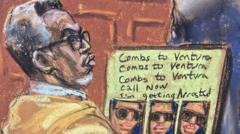In Sean Combs’ ongoing trial, prosecutors have presented testimonies from over 30 witnesses alleging abuse and manipulation, yet legal experts caution that mixed messages and lost testimonies could weaken the case. As the defense prepares to respond, critical questions remain about the strength of the prosecution’s arguments and the outcome of the trial.
Diddy’s Trial: Analyzing the Strength of the Prosecution's Efforts

Diddy’s Trial: Analyzing the Strength of the Prosecution's Efforts
As Sean "Diddy" Combs faces serious allegations of sex trafficking and racketeering, the prosecution's case hinges on the testimonies of former lovers and employees, but is it compelling enough for a conviction?
Prosecutors in New York are concluding their case against rapper Sean "Diddy" Combs in a high-profile federal trial focusing on allegations of sex trafficking and racketeering. The 55-year-old musician faces serious charges, accused of leveraging his substantial influence to exploit women and hide his misdeeds. Despite admitting to instances of domestic violence, Mr. Combs has denied the more severe claims, including those structured under laws traditionally used against organized crime figures.
Thus far, the prosecution has called over 30 witnesses, including former girlfriend Casandra Ventura—known as Cassie—and rapper Kid Cudi, among others. Their testimony paints a disturbing narrative of Mr. Combs' alleged abusive behavior. Notably, Ms. Ventura testified about her harrowing experiences, detailing how Mr. Combs coerced her into sexual encounters with escorts, often under the influence of drugs and violence. Her emotional recounting of these events during her late pregnancy, supplemented by harrowing surveillance footage and eyewitness accounts, is pivotal in the prosecution's argument that Mr. Combs engaged in sex trafficking—a charge that could carry a life sentence.
Complicating matters for the prosecution, Ms. Ventura's prior affectionate communications with Mr. Combs surfaced during the trial, introducing a layer of ambiguity about her experiences. Legal experts have noted that jurors may find it challenging to reconcile the loving messages with the allegations of coercion. Jennifer Biedel, a former prosecutor, underscored that modern awareness of domestic violence dynamics can complicate the jury's assessment of such complex emotional realities.
Moreover, the prosecution's case faced a setback when a third alleged victim they intended to call as a witness could not be contacted. Legal analyst Neama Rahmani pointed out that having multiple victims provides a more robust narrative in court, making jurors more inclined to believe cohesive stories from several witnesses.
Aside from sex trafficking, Mr. Combs also faces a significant racketeering charge, with prosecutors alleging he operated a "criminal enterprise" using loyal associates to facilitate his misconduct. The intricacies of proving this charge under the Racketeer Influenced and Corrupt Organizations Act (RICO) may be daunting for the jury, as the legal framework was designed to tackle organized crime, and its complexity could lead to confusion.
As the defense prepares to present its case, the decision not to call Mr. Combs to the witness stand might reflect a strategic choice to avoid exposing him to intense cross-examination. Although his attorneys have indicated they will forgo presenting any witnesses, legal experts assert that they may focus on undermining the prosecution's narrative rather than discrediting individual witnesses outright.
With the prosecution having laid out what they characterize as a compelling case against Mr. Combs, the upcoming defense arguments will be scrutinized closely as they try to challenge whether the presented facts meet the legal thresholds for sex trafficking and racketeering. The jury remains faced with navigating the multiple layers of this complex case, as the trial continues to unfold.





















